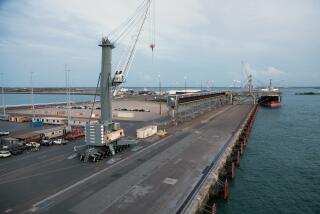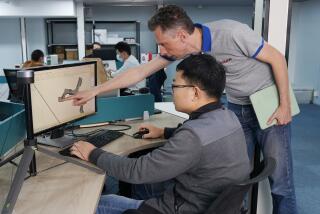China Army Reforms May Be a Long March
- Share via
SHANGHAI — It’s no great stretch to say that China’s military owns the Shanghai Stock Exchange. Sixty percent of this city’s gleaming new bourse, a 28-story monument to capitalism, belongs to the China Poly Group, a billion-dollar conglomerate backed by the People’s Liberation Army, with dealings in everything from missiles to cell phones.
By comparison, the Azure Heaven travel agency in Beijing is small fry, with fewer employees (about 30) than China Poly has subsidiaries (more than 100). Profits are modest. Yet it too ultimately reports to the PLA as part of the vast commercial empire--”PLA Inc.”--that China’s once-vaunted Communist armed forces have established over the past decade out of both need and greed.
All that is supposed to change under a sweeping order issued this summer by Chinese President Jiang Zemin that calls on the military to cease commercial activity and focus on modernizing the PLA as a fighting force.
But as the contrasting examples of China Poly and Azure Heaven show, a daunting--some say impossible--task looms ahead for reformers. The 15,000 or so PLA-backed businesses in China, which pump as much as $10 billion annually into the economy, come in such varieties of shape, size and clout that tracking them all down and rooting them out threatens to be a herculean task.
“Given the scale of these activities, it’s going to be exceedingly difficult to curtail this activity on a comprehensive basis,” said Jonathan Pollack, a China expert at the Rand Corp. think tank. “Jiang’s . . . zero-tolerance rhetoric sounds great. But ample caution is warranted.”
Analysts nearly all agree that no blanket approach is possible, despite the government’s one-note directive that the 3-million-strong armed forces “clear out” of all commercial endeavors.
China Poly and Azure Heaven illuminate the difficulties facing reformers as they grapple with PLA enterprises on opposite ends of the spectrum: from mighty to minuscule, experienced to neophyte. Whether authorities shut down some firms completely, sell them off, turn them over to nonmilitary government departments or simply recall army officers in management positions while maintaining silent control will probably depend on the companies’ political and economic influence.
Enforcing the new edict also will hinge on the political mettle of Jiang, who announced the policy as an effort to combat official corruption and smuggling, which run rampant in the PLA and rank as the No. 1 grievance among Chinese citizens.
Generals Probably Support President
Jiang’s campaign--one of his most ambitious yet as leader of the world’s most populous nation--will pit him against some powerful interests in China’s military-industrial complex. Many analysts believe, however, that he has the support of senior PLA generals who view the army’s commercial dealings as a drain on morale and battle-readiness.
“It will be very interesting to see if Jiang goes after various high-ranking officers, some of whom are directly implicated in graft and embezzlement charges,” Pollack said. “This would sell well and demonstrate to the public as a whole that the leadership is prepared to do more than the equivalent of shutting down bootleggers in the Prohibition era.”
China Poly, based in Beijing, is one of the most recognized names in China’s ever-growing world of commerce, with a pedigree few domestic corporations can match.
Its president, He Ping, is a son-in-law of the late “paramount leader” Deng Xiaoping and a major general in the PLA who once served as head of the military’s Armaments Department. Chairman Wang Jun--the son of another revolutionary hero, Wang Zhen--is a former navy man and student at the exclusive Harbin Military Engineering College. (His given name, Jun, means “soldier.”)
Although the Communist regime has tried to curb the power wielded by the children of high-ranking officials, China Poly has parlayed its impressive connections to become one of the PLA’s most lucrative enterprises.
In the West, the company is perhaps best known as a defense contractor, selling missiles and other weapons to countries such as Saudi Arabia. Last year, a China Poly offshoot was implicated in a plot to ship 2,000 contraband AK-47 rifles to the U.S. in the largest haul of smuggled automatic weapons ever seized by federal agents. The company’s role in the scheme, if any, is still unclear.
After Wang was named in the Washington foreign donations scandal, the U.S. media invariably described him as the “Chinese arms dealer” who once posed for a photo in the White House with President Clinton.
But the label underestimates the scope of China Poly’s holdings. It has stakes in industry, investment banking, infrastructure and real estate--including luxury villas in Beijing. It has also been linked to a U.S. steel mill. Moreover, China Poly’s ties to companies are not always open, which makes a true picture of its assets difficult to sketch.
Few doubt that the company is worth at least hundreds of millions of dollars. In the Shanghai Stock Exchange building alone--the hottest address in the city’s new financial district--office space is rented out at up to $3,000 per square yard. The bourse itself, which opened in its new space last December, forks over more than $600,000 a year to China Poly in maintenance costs.
Overall, the earnings help offset cutbacks in Beijing’s military spending since the 1980s, which fueled the PLA’s jump into the business world in the first place.
Most Predict Huge Company Won’t Close
With so much cash pouring in, no one imagines that the central government will shut down China Poly any time soon; the company’s enormous size, reach, profitability and political connections effectively protect it. At most, observers predict a transfer of authority as a result of the new edict.
“I think we will see the army move out of direct involvement with these enterprises and turn the running of the commercially successful ones over to demobilized soldiers and PLA dependents,” said John Frankenstein, a professor at the Copenhagen Business School in Denmark, who has studied the PLA’s commercial dealings.
China Poly represents the very top tier of PLA-backed businesses, giants that together account for the lion’s share of the money the military rakes in from such ventures. But by far, most PLA companies are small firms that generate low returns, analysts say. Some even operate at a loss.
At the Azure Heaven travel agency, the deputy general manager is a PLA colonel with a background in communications, not business. “He’s a layman,” one staff member said.
Travel Agency Boss Mum About Military
The rank and file are not affiliated with the PLA. But they are aware of their boss’ connection, which does not appear to bother them except for what one employee described as a gruff managerial style more suitable for an army regiment than a civilian business.
In an interview, J. Z. Wong refused to discuss his military status, insisting that he speak to a reporter only in his capacity as Azure Heaven’s deputy general manager, or No. 2 in command.
He acknowledged that he had little business experience when the company started up less than three years ago. Research trips to places such as Israel and England taught Wong what he knows about international travel service standards, which he hopes to replicate in China.
In 1996, Azure Heaven turned a decent profit, said Wong, who declined to provide specific figures. Last year saw a drop because of increased competition.
The relatively small size of Azure Heaven and other such businesses makes their fates less certain than moneymaking monsters like China Poly. Wong said he remains confident that Azure Heaven will survive.
Wong is not unique in not knowing how or when the recent decree will affect PLA Inc. Unlike other reforms announced by the government, the order to overhaul the military’s commercial activities came with no timeline attached.
That leaves wiggle room for the central government to work out how to implement its policy, the success--or failure--of which will become apparent only over some length of time, experts say.
“If it unfolds smoothly, and this is not at all certain, several years will be needed to dislodge the military entrenched in commercial enterprises,” Ellis Joffe, a professor of Chinese studies at Hebrew University in Jerusalem, wrote recently. “Even then, changes may be limited.”
More to Read
Sign up for Essential California
The most important California stories and recommendations in your inbox every morning.
You may occasionally receive promotional content from the Los Angeles Times.











